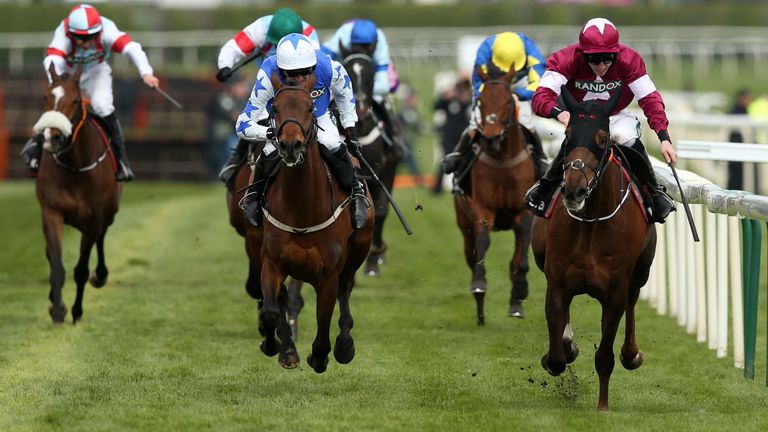'Thoroughbred horses are bred to race - it's in their DNA'
Friday 5 April 2019 23:01, UK
For jockeys, trainers, punters and bookmakers, no other day in the sporting calendar generates the same excitement as the Grand National.
But the fervour that surrounds Aintree also attracts the attention of those opposed to horse racing, claiming it is a brand of animal cruelty.
Racehorse trainer Lawney Hill defies such criticism - she says racing is in these animals' very DNA.
I've been training horses for almost 30 years, with a professional trainers' licence since 2005.
With my husband, we run a small yard with a dedicated team and we pride ourselves on ensuring our horses receive individualised, tailored care. Every horse has a different personality and different needs - we make sure that they are all met, round the clock.
Take Clondaw Westie, who's running in the race before the National at Aintree. He's a cheeky, busy character, who always knows best.
We've nurtured him until he's ready to step up to another level and we know he'll be pulling hard today.
This is what being a racehorse trainer is all about. It is not an industrial operation.
Whether you are a big yard or a small yard you can't have any form of success unless your horses are in the best possible health, and you can't have healthy racehorses without giving them constant care with a personal touch.
As a result of this, everyone in the yard forms such a close bond with the horses they look after. The remarkable people who work in racing do so not for the money or the glamour, but the love of horses.
There are early mornings and often hard and demanding work in all weather conditions, but my team and I love it because we all want nothing more than to be around horses and to see them thrive. We invest our heart and soul into them. They are more than just horses, they are our friends, our confidantes, and our family.
One thing that we all recognise when we work with horses is that they can hurt themselves - and they have an uncanny knack of doing this at any time.
It doesn't matter whether they are racehorses, ponies or the much-loved companion of weekend riders, their physique and their exuberance puts them at risk, whether they are at home in their box, working on the gallops, turned out in a field, or racing.
Anyone who works with horses will tell you the same thing.
This is why we give them such constant care and attention.
Our job is to do all we can to equip them for the experience of racing. As a sport, great strides have been made on this front. Racecourses, jockeys and trainers work with the independent regulator, the BHA (British Horseracing Authority), to use data and science and make improvements wherever we can.
As a result of this, the sport is much safer now than it was when I first started, for horses and for jockeys, where we've applied just the same professionalism.
However, no sport like ours can ever be 100% safe. Accidents will happen.
Occasionally those accidents lead to catastrophic outcomes that can't be treated.
Trust me, there is simply no worse feeling as for trainers, owners and carers of horses than coming home with an empty trailer and waking up to an empty box. It affects us all greatly.
It's like losing a friend and we grieve in a similar way.
However, we reassure ourselves that we can say with hand on heart that our friends wanted for nothing in their lives and would have lived a lifestyle that most other animals can only dream of.
Thoroughbred horses are bred to race. That is their calling in life. It is their instinct and in their DNA. They revel in the task. It is natural to them, the result of 300 years of breeding.
Occasionally, we hear it said that they are just commodities for the sport - nothing is further from the truth.
Anyone who thinks that, should consider how the industry was closed down for six days - costing the sport and participants millions of pounds - based on an outbreak of equine flu.
Money counts for nothing where the health and well-being of our friends is involved.







